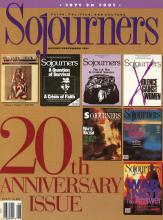A reflection on the occasion of Sojourners' 20th anniversary in 1991.
When I think about the life and work of Sojourners over the past 20 years, the question that the little boy asked the prophet comes to mind: "Dear Prophet, why do you keep prophesying when nobody listens to your words and when nobody changes their life?" The answer to that question was and always will be, "I prophesy, not simply to change the world, but to prevent the world from changing me."
Sojourners' task is to be that of the prophet who prophesies even when very few people listen or change their lives. And I deeply believe that the great call for Sojourners is not simply to bring about changes in our society but to live an authentic, faithful life in the middle of a world that continues to be very dark, very cruel, very exploitative, and very oppressive.
Sojourners and all those who support Sojourners were not able to prevent the [first] Gulf war, but that doesn't mean that the voice of protest against that war was not necessary and important. It is a voice that, first of all, wants to remind us of our vocation in this world as strangers in a strange land, constantly calling people to recognize God's love and constantly challenging people to choose that love instead of fear and all its consequences.
As I think about the future of Sojourners, I feel very strongly that it will be crucial for it to keep calling its readers to live the brokenness of the world and their own brokenness under the blessing. Our great temptation is to live our pain and the pain we see around us as a sign that we are unworthy and unloved. But then we live it under the curse. And when we live our suffering under the curse, it leads to more suffering and eventually to despair.
Read the Full Article

